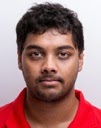 |
| Dinuk Kolambage |
The Australian
AS journalists around the world reel over lengthy prison sentences handed down to three Al Jazeera reporters in Egypt, a media freedom controversy has erupted in Sri Lanka after the editor of the Daily News called for the arrest of a local Al Jazeera journalist for reporting on inter-religious riots. In a series of Twitter rants, the state-owned newspaper’s editor, Rajpal Abeynayake, accused Al Jazeera’s Colombo stringer, Dinouk Colombage, of inciting religious tensions by reporting on Buddhist-Muslim clashes last week in southwest Aluthgama in which four people died and about 80 more were injured.
He accused Colombage, an experienced Sri Lankan reporter who writes a Huffington Post column, of exaggerating the toll and being a “social media murderer”.
“Arrest Twitter murderers Groundviews, Colombage etc,” Abeynayake demanded in one tweet on Monday, referring also to a Sri Lankan citizen journalism website often critical of the Rajapaksa government. Several of the tweets copy in President Mahinda Rajapakse’s official twitter account and that of his son. In another tweet, in which the editor refers to the writer as a “Twitter murderer sicko scumbag”, he copies in Sri Lanka’s consul-general to Australia, Bandula Jayasekara.
On Monday three Egypt-based Al Jazeera journalists, including Australian Peter Greste, were jailed for at least seven years on charges ranging from aiding the Muslim Brotherhood and reporting false news — all denied by the reporters and Al Jazeera. Two Al Jazeera journalists were found guilty in absentia and sentenced to 10 years’ jail.
The latest attack on an Al Jazeera field reporter is being taken seriously by the Qatar-based news service, which told The Australian yesterday it would be seeking assurances of Colombage’s safety “at the highest level”.
The incident has raised renewed concerns generally over press freedom in Sri Lanka, one of Australia’s closest regional allies. The Committee to Protect Journalists ranked Sri Lanka fourth — behind Iraq, Somalia and The Philippines — in a list of countries where the murder of journalists is most likely to go unpunished.
Last week’s riots, following a street march by Buddhists from the radical Bodu Bala Sena, were subject in large part to a media blackout in Sri Lanka but were reported by international news agencies and on social media.
“Basically the government enforced a bit of a media blackout on what was happening so it was really myself and the BBC reporting what was happening,” Colombage told The Australian yesterday, adding his information on casualties was coming from police officials and hospital officials.
“It was the first time social media really played a big role in breaking news in Sri Lanka.”
While the Daily News has played down the unrest, accusing the US embassy and other Western “neocon” forces of helping to foment violence, the riots prompted a warning to Australian citizens from the Department of Foreign Affairs and Trade to exercise caution in Sri Lanka.
Abeynayake said he did not know Colombage worked for Al Jazeera, and called for his arrest before the sentencing in Egypt.
However, he insisted he stood by his comments, telling The Australian: “In this country if you spread rumours, particularly when a dangerous situation is developing, you can be jailed.
“When you double the figures of people killed you incite further violence. This guy is an accessory to murder